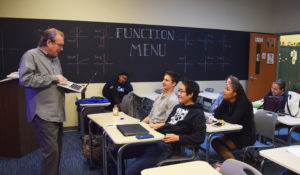This spring, fifteen juniors and seniors are treated to early real-life lessons in thinking about money, wealth, and financial choices in a new Personal Finance elective.
Ken King, parent to three Crossroads alumni (Megan ’15, Brendan ’18, and Kellen ’18), Crossroads tennis and middle school basketball and baseball coach, and a retired partner with Edward Jones, approached Crossroads with the idea of the course.
“For some people, the term finance is boring and intimidating; I don’t want students to have that feeling,” says Ken. “In my career, I often saw that many people were learning by trial and error – your first credit card, checking account, getting over-extended, taking on a large mortgage – it’s like trying to change a tire while the car is going down the street. I wanted to give students the opportunity to think about these topics from an early point.”
The class tackles topics such as borrowing, covering credit cards, mortgages, student loans, and calculating interest payments. They move onto the differences between stocks and bonds and retirement accounts, building off of curriculum developed from the National Endowment for Financial Education.
Students are energized and bring in questions they hear about in the headlines for discussion, whether it’s stock market news or the recent college admissions scandal.
Ken’s aims are not only to provide foundational financial literacy, but also to get students thinking about broader questions of wealth. “We’ve had fascinating discussions about it means to be wealthy. For these students it doesn’t mean buying a yacht, but it might mean having the flexibility to take a trip or do something they’re passionate about. They want to know how to make their finances work for their lives and their goals.”
He adds that the students are already thoughtful about their choices. “We did an exercise about what they value at the beginning of the course. We talk about what it means to live a life of dignity and reflect your personal values in the way you spend. Do you need these things? How do you feel about being charitable? I’m not giving them my values. But the way you express these things is a reflection of your values. The students have been so receptive.”
One of the biggest “aha” moments in the class came looking at the value and impact of education on earning power. Individuals who don’t graduate high school anticipated earnings of about $950,000 over the course of their lives, but that earnings power increases to $1.2 million after graduating high school. If you graduate college, it’s $2.3 million. If you get a master’s degree it goes to $2.8 million, and the numbers increase as you obtain other degrees. Ken adds: “we were able to calculate the contribution to lifetime earnings of a day in high school is $611! When students get bored or don’t want to be here, try a different hat on. Each day at Crossroads you’re earning $611. Every day you sit in a college class, your earnings increase by $1,500.”
Ken imparts to students that they are “making an investment in [themselves]. And students have a brand new appreciation for the investment their parents are making in them.” As a parent to three Crossroads alums, Ken understands this well!

